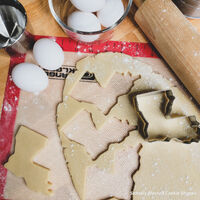

LOUISIANA COTTAGE FOOD LAW
Louisiana Cottage Food Types
Many states regulate “cottage food,” meaning food made in a home kitchen for sale. Louisiana allows the sale of “low-risk foods,” which generally refers to shelf-stable foods that do not require time or temperature controls for safety. The law specifically permits the sale of homemade breads, cakes, cookies, pies, cream or custard-filled pastries, candies, dried mixes, honey and honeycomb products, jams, jellies, preserves, pickles and acidified foods, sauces, syrups and spices.
What Shelf-Stable Foods Can I Sell in Louisiana?
Baked goods, candies, cane syrup, dried mixes, jams, jellies, sauces, syrups, and spices.
Can I Sell Refrigerated Baked Goods in Louisiana?
Yes
Can I Sell Meat in Louisiana?
No
Can I Sell Acidified or Pickled Foods in Louisiana?
Yes
Can I Sell Low-Acid Canned Goods in Louisiana?
No
Can I Sell Fermented Foods in Louisiana?
No
Louisiana Cottage Food Venues
Louisiana cottage food producers may sell their products almost anywhere without restriction. The state allows direct sales, including online sales, for all Louisiana cottage foods at private residences, roadside stands, special events and farmers’ markets. The state also allows retail sales in businesses like restaurants, grocery stores and coffee shops for all products except breads, cakes, cookies and pies. Once a Louisiana cottage food operation is running, the state caps annual gross revenue at $30,000.
Annual Sales Cap $30,000
Where Can I Sell Homemade Food Direct to Consumers in Louisiana?
No restrictions
Can I Sell Homemade Food to Retail Outlets Like Restaurants and Grocery Stores?
Yes, but not breads, cakes, cookies and pies.
Online Orders
Yes
Mail Delivery
Yes
Louisiana Cottage Food Labels
Louisiana cottage food producers must attach a disclaimer on all their products. The instructions are fairly simple: Any individual who prepares low-risk foods in the home for sale “shall affix to any such food offered for sale a label which clearly indicates that the food was not produced in a licensed or regulated facility.”
Getting Started in Louisiana
Louisiana cottage food producers do not need government inspections, permits or training to get started. However, the law requires Louisiana cottage food producers to obtain a general sales tax certificate from the Louisiana Department of Revenue and a local sales tax certificate from the local taxing authority of any jurisdiction where they intend to sell foods. The state also bans Louisiana cottage food producers from employing assistants.
Inspections Required Before Starting?
No
Are Local Ordinances Preempted or Overridden?
No
License, Permit or Registration Required?
No
Recipe Approval or Lab Testing Required?
No
Food Handler Training Required?
No
Louisiana Cottage Food Facts
Myths about cottage food abound. Here are the facts.
Cottage food is safe. Critics who talk about the risk of food-borne illness give hypothetical examples of what could go wrong because real-world cases are rare or nonexistent.
Cottage food is local. When neighbors trade with neighbors, money stays in the local economy.
Cottage food is transparent. People who buy from a cottage food producer know what they get. If they have questions about ingredients, sourcing or safety, they can ask.
Cottage food creates jobs. Many homemade food producers use their income to provide for their families. Others seek a secondary or supplemental income.
Cottage food empowers women. IJ cottage food research shows that most cottage food producers are women, and many live in rural areas with limited economic opportunity.
Cottage food expands consumer choice. Some stores simply don’t sell what you want. This is especially true if you have a gluten-free, peanut-free, halal, kosher or vegan diet. Cottage food fills market gaps, giving consumers more options.
